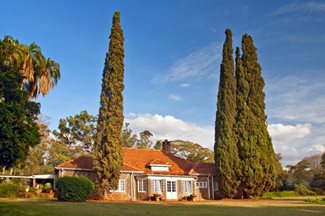
It is not hard to pick up Karen Blixen’s trail: she tells you where to begin in words made famous by Meryl Streep at the beginning of
Out of Africa, the biopic based on Blixen’s eponymous memoir:
“I had a farm in Africa at the foot of the Ngong Hills. The Equator runs across these highlands, a hundred miles to the north, and the farm lay at an altitude of over six thousand feet. In the day-time, you felt that you had got high up; near to the sun, but the early mornings and evenings were limpid and restful, and the nights were cold.”
Karen Blixen arrived in what she would have called British East Africa in the beginning of 1914. Desperate to escape a dull and predictable upper-class life in her native Denmark, Karen married her Swedish cousin, Baron Bror von Blixen-Fineke (Klaus Maria Brandauer played Bror masterfully in
Out of Africa, a role for which he won Best Supporting Actor). Bror had already made a name for himself as a big-game hunter of both The Big Five and Nairobi’s morally-dubious expatriate women; he was undoubtedly a rogue, but, according to Karen Blixen’s contemporary, the aviatrix Beryl Markham (Felicity in
Out of Africa), he was a very entertaining one:
"Bror was the toughest, most durable white hunter ever to snicker at the fanfare of safari or to shoot a charging buffalo between the eyes while debating whether his sundown drink would be gin or whiskey..."
Fidelity was not the Baron’s forte - he infected his wife with syphilis, which left her barren and ill for the rest of her life - and he was no businessman either. The coffee plantation the pair purchased at the foot of the Ngong Hills was a failure, as was the marriage.
As fans of
Out of Africa know, Karen Blixen’s two great loves were Africa and the big-game hunter and safari guide, Denys Finch-Hatton, played by Robert Redford in the film, although the real Finch-Hatton was British and bald.
Of Denys, Karen later claimed in her memoir,
Out of Africa:
“I am for all time and eternity bound to Denys, to love the ground he walks upon, to be happy beyond words when he is here, and to suffer worse than death many times when he leaves.”
Of Africa itself, she was equally enraptured:
“Up in this air, you breathed easily, drawing in a vital assurance and lightness of heart. In the highlands, you woke up in the morning and thought: Here I am, where I ought to be.”
Blixen and Finch-Hatton fell in love, and for more than ten years they lived together on her farm, which he used as his primary base when he was not on safari. Together they explored the vast stretches of the Maasai Mara, part of which today bears her name.
Finch-Hatton was tragically killed in a plane crash in 1931, the same year Blixen’s coffee company went bankrupt, forcing her to leave Africa and return to Denmark. There she lived out her days
“…writ(ing) a little every day, without hope, without despair." She revisited her twin great loves in masterful books published under the nom de plume of Isak Dinesen:
Out of Africa,
Shadows on the Grass, and
From the Ngong Hills as well as other masterpieces such as
Babette’s Feast,
The Ring, and others. She was a nominee for the Nobel Prize 12 times but lost each time to the likes of Boris Pasternak and Ernest Hemingway, the latter a hunting buddy of her estranged husband, Bror Blixen.
In her later years, Blixen wondered if she would be remembered in Africa:
“If I know a song of Africa, of the giraffe and the African new moon lying on her back, of the plows in the fields and the sweaty faces of the coffee pickers, does Africa know a song of me? Will the air over the plain quiver with a color that I have had on, or the children invent a game in which my name is, or the full moon throw a shadow over the gravel of the drive that was like me, or will the eagles of the Ngong Hills look out for me?”
She needn’t have worried. Her name lives on in the Karen Blixen Museum, housed in the farm at the foot of the Ngong Hills, once an uninhabited wilderness but today part of a sprawling subdivision of Nairobi that is just called “Karen” in her memory. Denys Finch-Hatton is buried there. Part of the vast Maasai Mara National Reserve bears Karen’s name, now perennially popular with visitors to Kenya thanks in large part to the famous film poster of
Out of Africa, featuring Streep and Redford seated on a grassy knoll.
One can get a sense of what Karen’s Nairobi was like at the Fairmont Norfolk Hotel, built in 1904, which hosted royalty, luminaries, and celebrities such as The Prince of Wales (later Edward VIII) and Ernest Hemingway. The Muthaiga Country Club, where some of the memorable scenes in
Out of Africa take place, is still a members-only country club, but unlike in Karen Blixen’s day, women are allowed in the bar.
Follow in Denys Finch-Hatton and Karen Blixen’s footsteps
On Safari in Kenya & Tanzania, with Alexander + Roberts’s 12-day itinerary. This comprehensive safari tour includes a balloon safari over the Maasai Mara to see the African plane as they would have done. Speak to one of our knowledgeable reservation agents to learn more.